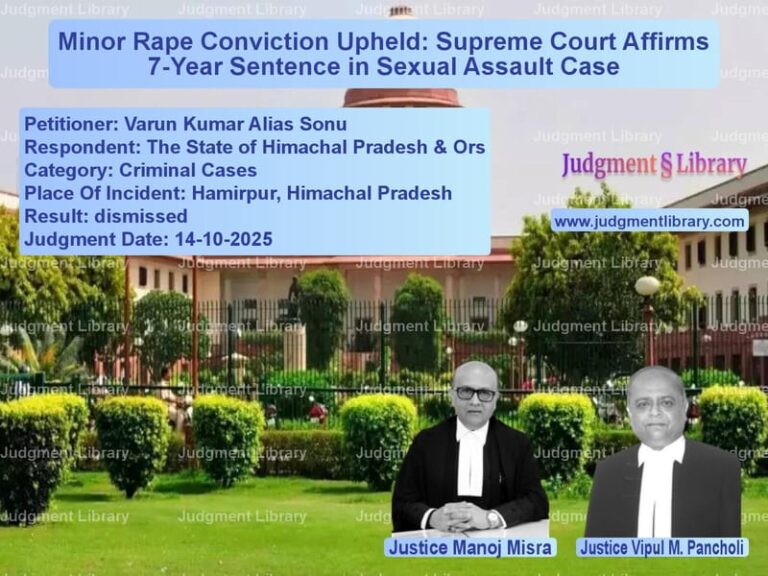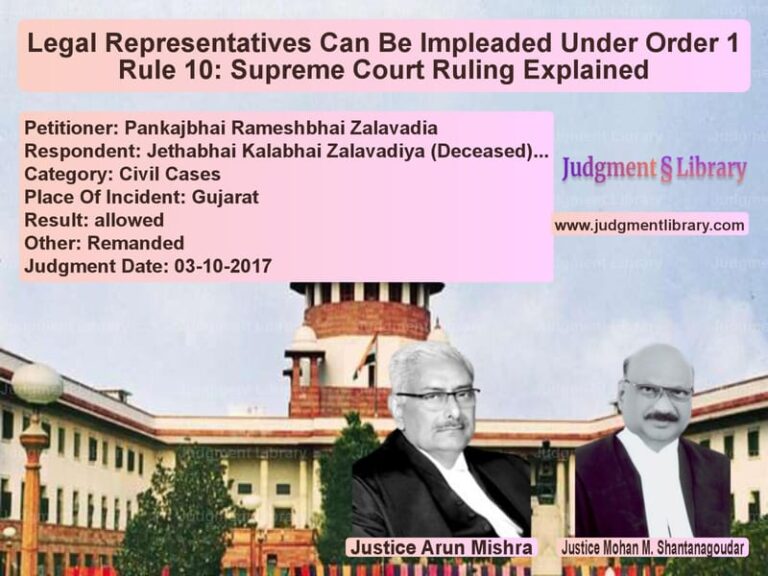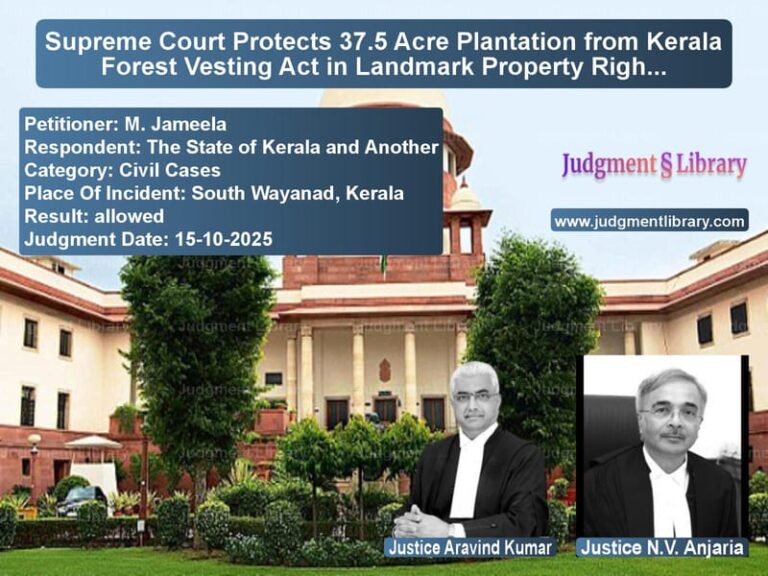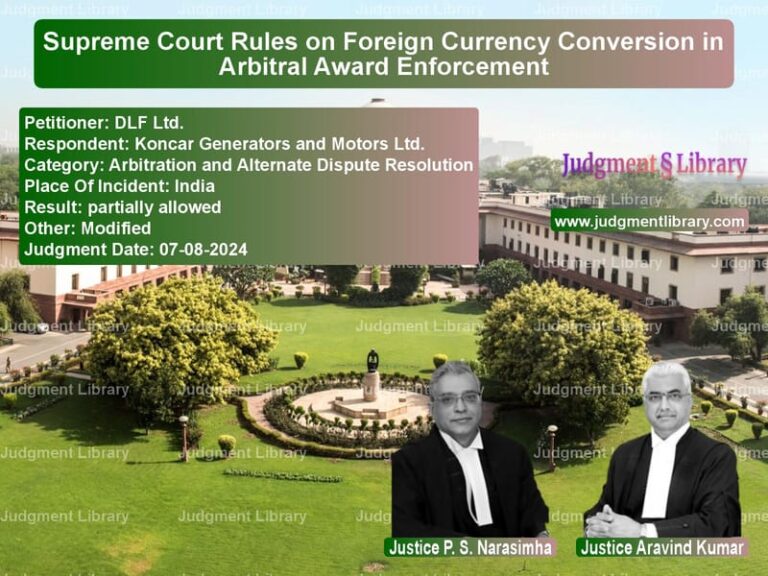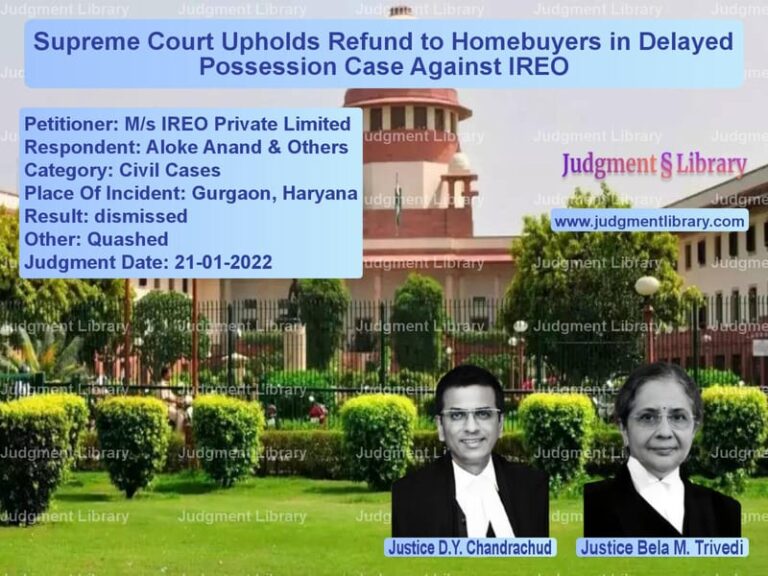Trust Property Sale and Charity Commissioner’s Role: Cyrus Rustom Patel vs. Charity Commissioner, Maharashtra
The case of Cyrus Rustom Patel vs. Charity Commissioner, Maharashtra revolves around a contentious sale of trust property and whether the transaction complied with the requirements of the Bombay Public Trusts Act, 1950. The Supreme Court examined whether the Charity Commissioner had exercised due diligence in granting sanction for the sale and if the trust had acted in the best interests of its beneficiaries.
The dispute began when the B.C. Batliwala Agiary Trust, registered under the Bombay Public Trusts Act, 1950, decided to enter into a joint venture agreement with M/s. Astral Enterprises for developing trust property. The agreement included provisions for either developing the property or converting it into an outright sale. The Charity Commissioner granted sanction for the transaction, but the appellant, Cyrus Rustom Patel, challenged the decision, arguing that the sale was not in the best interests of the trust.
Background of the Case
The property in question was the Fire Temple located at 160 Tardeo, Mumbai, with an area of approximately 3012 square meters. It was an old structure, constructed before 1940, requiring extensive repairs. The trust, citing a lack of funds, decided to enter into a development agreement.
According to the agreement:
- The developer, M/s. Astral Enterprises, was to provide flats to existing tenants in new buildings on an ownership basis.
- The developer was responsible for construction costs and other related expenses.
- The trust had the option to convert the development agreement into an outright sale.
- The transaction was valued at Rs. 2,95,00,000.
The Joint Charity Commissioner sanctioned the agreement under Section 36 of the Bombay Public Trusts Act. However, the appellant alleged that the agreement was not transparent and that the Charity Commissioner had failed to ensure that the trust obtained the best value for its property.
Legal Issues
The Supreme Court identified the following key legal questions:
- Did the Charity Commissioner follow due process while granting sanction for the sale?
- Was the sale conducted in the best interest of the trust?
- Did the trust act transparently in entering into the agreement?
- Was the sale price fair, considering the market value of the property?
Arguments by the Appellant (Cyrus Rustom Patel)
The appellant contended:
- The sale was not in the best interest of the trust, as the property’s market value was significantly higher than the agreed sale price.
- The Charity Commissioner failed to ensure that the trust received the best possible offer.
- No public notice was issued for inviting bids, leading to a lack of transparency.
- The trust trustees acted in collusion with the developer, undermining the interests of the beneficiaries.
Arguments by the Respondent (Trust & Charity Commissioner)
The respondents argued:
- The transaction was necessary to ensure the upkeep of the temple and the welfare of the tenants.
- The Charity Commissioner’s role was limited to sanctioning or rejecting the sale, and it was not required to invite third-party bids.
- The property was in a dilapidated condition, and no other developer was willing to undertake the project while preserving the Fire Temple.
Observations of the Supreme Court
The Supreme Court analyzed the role of the Charity Commissioner under Section 36 of the Bombay Public Trusts Act. The Court observed:
‘The power to grant sanction has to be exercised by the Charity Commissioner, taking into consideration the interest, benefit, and protection of the Trust. In this case, the Joint Charity Commissioner failed in exercising this duty.’
The Court further held:
‘The Charity Commissioner has abdicated its responsibility by merely approving the transaction without verifying whether the trust was receiving the best value for its property.’
The Court was critical of the fact that no public notice was issued to invite competing bids, which could have ensured that the trust received the best possible deal.
Final Judgment
The Supreme Court set aside the order of the Charity Commissioner and the High Court and ruled:
- The sale transaction was not in the best interest of the trust and could not be sustained.
- The trustees acted in collusion with the developer, leading to an undervaluation of the property.
- The trust must repay Rs. 2,95,00,000 to the developer.
- The matter should be reconsidered, with a fresh sale process conducted through public bidding.
Impact of the Judgment
This ruling has significant implications for the sale of trust properties:
- It reinforces that the Charity Commissioner must ensure that trust properties are sold transparently and at fair market value.
- It emphasizes that public bidding is necessary to prevent collusion and ensure competitive offers.
- It protects trust beneficiaries from trustees making arbitrary decisions that could harm the trust’s interests.
Conclusion
The Supreme Court’s judgment in Cyrus Rustom Patel vs. Charity Commissioner, Maharashtra underscores the importance of transparency and due diligence in the sale of trust properties. The ruling ensures that trust properties cannot be disposed of arbitrarily and that the Charity Commissioner must act in the best interests of the trust. By requiring a fresh sale through public bidding, the Court has set a precedent for fair dealings in trust property transactions.
Don’t miss out on the full details! Download the complete judgment in PDF format below and gain valuable insights instantly!
Download Judgment: Cyrus Rustom Patel vs Charity Commissioner Supreme Court of India Judgment Dated 21-09-2017.pdf
Direct Downlaod Judgment: Direct downlaod this Judgment
See all petitions in Property Disputes
See all petitions in Contract Disputes
See all petitions in Landlord-Tenant Disputes
See all petitions in Judgment by Arun Mishra
See all petitions in Judgment by Mohan M. Shantanagoudar
See all petitions in allowed
See all petitions in Quashed
See all petitions in supreme court of India judgments September 2017
See all petitions in 2017 judgments
See all posts in Civil Cases Category
See all allowed petitions in Civil Cases Category
See all Dismissed petitions in Civil Cases Category
See all partially allowed petitions in Civil Cases Category


